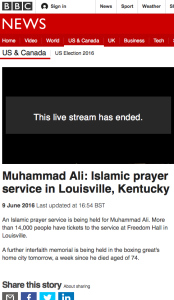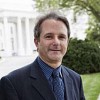OPINION
On Any Given Day: BBC Continues Its Live Program Dominance Over the Voice of America
By Dan Robinson

Thursday June 9th brought one of the most glaring examples of how one global, impactful, news organization — that would be the BBC — so often dominates another that has, to put it mildly, struggled in recent years — the Voice of America.
VOA used to be known for having a number of pretty good news programs, especially back in the days when it was still a major broadcasting force with extensive global shortwave radio transmissions.
Many current and former correspondents, including myself, recall providing live analysis and commentary from numerous locations around the world, including from Washington, DC.
VOA is not alone among international broadcasters in having reduced its use of shortwave — BBC too has done so, and in recent years many international broadcasters have left the high frequency bands in favor of online activities, including online radio.
However, despite these reductions, the BBC continues to excel at long form live radio and TV programming. It has continued to demonstrate mastery in this area when compared to products that emerge from VOA.
Such was the case on June 9th, involving BBC coverage of events in Louisville, Kentucky, memorializing the globally-recognized and loved Mohammad Ali.
[BBC – Muhammad Ali memorial begins with Muslim prayer service]
[BBC – In pictures: Muhammad Ali’s love affair with Africa]
[BBC – Muhammad Ali: Interviews, clips and documentaries, gathered by BBC Radio, in honour of the great boxing legend.]
[BBC – Muhammad Ali: A Tribute]
Here was a story on which the Voice of America could have shined, but ended up embarrassing itself.
 BBC’s 53 minute-long-edition of World Have Your Say, with a record of gold star coverage of world and U.S. domestic news, went live from Louisville, hitting every mark it’s possible to hit.
BBC’s 53 minute-long-edition of World Have Your Say, with a record of gold star coverage of world and U.S. domestic news, went live from Louisville, hitting every mark it’s possible to hit.
After a live hand off from a London announcer at 1600 UTC, BBC correspondent Nuala McGovern, microphone in hand, interviewed people on the street — from across the U.S. and overseas, all the while background audio (including the Muslim prayer for the departed), and descriptions of the scene.
Outside Freedom Hall, Jerry Martin, a U.S. air force veteran from Martinsville, Virginia, explained why he brought his horse — to represent the riderless horse in honor of the late Ali.
Back in London, there was live studio conversation with an imam from the Sheikh Nazim Sufi Center, explaining the Janaza Prayer honoring Ali, and Gavin Evans, author of a book on heavyweight boxing.
The broadcast took the time to go live for some time to the man officiating, welcoming Muslims and those of other faiths, everyone who made the trip to Louisville including heads of state.
In a mid-break summary the BBC switched the Ali prayer service to the lead in World Service broadcasts, briefly relegating to No 2 the meeting between Democratic presidential candidate Bernie Sanders and President Barack Obama.
There was a previously-recorded interview with former professional boxer Nate Tubbs, from Cincinnati. Tubbs said Ali gave young black men an opportunity to realize their self-worth and spoke about challenges facing black communities including potential violence in confrontations with police.
Back live to McGovern interviewing a young man, with two children 6 and 3 years old, originally from Senegal but in the United States for 18 years. He said he brought them to see that Mohammad Ali was a man of God (who noted he had been interviewed earlier by CCTV of China).
McGovern told the man he had been “speaking to people from all over the world” via the live BBC broadcast.
There followed a recorded interview with the grandson of Elijah Muhammad, the late Nation of Islam leader. Live again to Louisville with others attending the memorial ceremony, including Muslims from Tennessee, and two Christian women from Louisville who said Ali brought people together from all walks of life.
With its fascinating detail, and anything-can-happen pace, this broadcast was truly the stuff of live radio. And it’s quite typical for the BBC, which (its promos say — “online, on mobile, and on-the-air”) so often out-competes the Voice of America on U.S. domestic stories.
Let’s contrast this with what was seen or heard (or not) from VOA around the same time:
VOA newscasts (boasting “give us 5 minutes, we’ll give you the world”) at 1600 and 1700 UTC contained not a single mention of the Ali ceremony in Louisville.
Links for live VOA audio streams (this is programming to Africa) had no live content.
VOA program for Africa “Sonny Side of Sports” had a pre-recorded report and interview about Mohammad Ali and plans for his funeral on Friday but no live reporting from memorial events in Louisville on Thursday.
Visible on the VOA website was one video story by a VOA reporter, but nothing in introductory material linking over to the memorial event.
No live sound from the live event in Louisville was heard anywhere in VOA newscasts in contrast to live audio from the BBC.
Absence of any promos about any upcoming VOA programming relating to the remainder of the Ali events in Louisville.
No live video of the Louisville memorial was seen on VOA’s website.
One hopes there would be no need to state why all of this is important, but I’ll try to sum it up.
The Louisville event on June 9th constituted a big story for hundreds of millions the world over whose lives and experiences spanned those of the late champ. He was a sports figure but also involved in turbulent political times visible to the world, enormously significant for generations past and future.
The BBC broadcast brought out in the best of ways . . .LIVE, with voices of those who traveled to pay tribute, with experts discussing the religious significance of what was being heard, that he was loved by fellow Muslims, and non-Muslims, in the U.S. and elsewhere.
What listeners to VOA got, accessing online or on-the-air, was essentially, nothing — aside from a single, obviously earlier-produced two minute forty five second video story. Audio streams did not perform, at least at the time the Louisville memorial began. VOA’s English newscast summaries mentioned nothing.
For nearly an hour, as occurred so many times in the past, the BBC dominated this American, but also hugely global, story — and did it online, on mobile (for those accessing that way), and on-the-air.
Precisely because of such coverage . . . because the BBC was seen and heard to be delivering such an overwhelmingly superior package of programming. . .is a reason VOA managers, including the new director, should be frankly, embarrassed.
Was it a resource issue? A failure of imagination in planning? Did anyone suggest staffing up in Louisville in a way that would have competitively shown the flag on this story? Hard to know. What is clear by now, based on years of close observation, is this:
On any given day, particularly where important U.S. domestic stories are concerned, the once proud VOA news machine will be outgunned by BBC and its superior planning, technical capabilities and implementation.
Based on this performance, if I were a radio listener in Africa, or anywhere in the world for that matter — including the United States where VOA online products can obviously be heard and seen — I would have been disappointed. . . and more likely than not, turning to the BBC, or to some other media outlet.
I was asked recently by a top VOA official how I would know if VOA were doing a better job. That’s one hell of a question, given the horror stories that have emerged from 330 Independence Avenue S.W.
The answers aren’t difficult, and they are numerous, but here is one: if as a user of VOA products, I had heard anything approaching the kind of effort undertaken by that BBC live show on June 9th, 2016, that would have been an improvement.
 Dan Robinson retired in 2014 after 34 years with the Voice of America. In addition to his White House posting as senior VOA correspondent, he served as bureau chief in Nairobi, Kenya and Bangkok, Thailand. He was also the chief of the VOA Burmese Service and the Capitol Hill correspondent.
Dan Robinson retired in 2014 after 34 years with the Voice of America. In addition to his White House posting as senior VOA correspondent, he served as bureau chief in Nairobi, Kenya and Bangkok, Thailand. He was also the chief of the VOA Burmese Service and the Capitol Hill correspondent.
###
